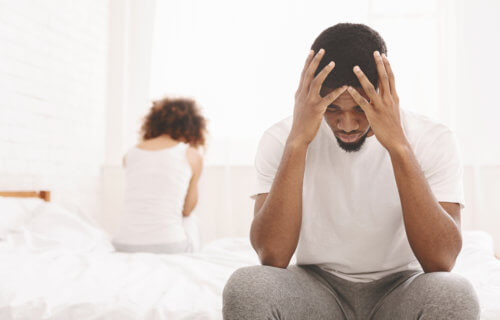WASHINGTON — Stress has a way of infiltrating every aspect of life. It can even affect our relationships. You’re stressed out over a new project at work or an unexpected problem with your car, and before you know it you’re arguing with your spouse over who was supposed to clean the coffeemaker last night. Of course, there’s been no bigger stressor as of late than COVID-19. Interestingly, a new study finds that people who blame their stress on the pandemic more than on their significant other are both happier and better equipped to maintain their relationship.
The stress that COVID brought to life in 2020 would have seemed absolutely unimaginable in 2019. This research shows that the people who were able to recognize just how much that stress was affecting them did a much better job of keeping their relationships healthy.
People usually know natural disasters are not their partner’s fault
Previous studies have also uncovered similar patterns. Generally, when one or both parties in a romantic relationship are under heavy stress it’s going to lead to arguments and discontent. However, research shows that this trend doesn’t hold up when it comes to events like natural disasters. Why? During a rare event like a natural disaster (or a viral pandemic), people may be more aware that stress is affecting them and that their stress is due by extreme circumstances far outside of their partner’s control.
“Because of this awareness, when major stressors occur, romantic partners may be less likely to blame each other for their problems and more likely to blame the stressor, which may reduce the harmful effects of stress on the relationship,” says study co-author Lisa Neff, an associate professor of human development and family sciences at The University of Texas at Austin, in a media release.
Researchers collected data from 191 participants during the early months of the pandemic and then again seven months later. Specifically, researchers looked to determine if blaming COVID-19 for various problems led to reductions in relationship issues linked to stress.
“As expected, people generally were more blaming of the pandemic for their current problems than they were blaming of their romantic partner,” Prof. Neff adds. “Individuals who were more blaming of the pandemic were more resilient to the harmful effects of stress.”
Each participant filled out a survey asking about the degree to which they blamed the pandemic for their problems. Then, the group took a daily survey every day for 14 days. Those surveys zeroed in on daily life stressors, relationship satisfaction, and negative behavior toward partners.
Knowing where stress comes from may not fix everything
Study authors clarify that identifying the sources of stress is not a cure-all for couples. If the stressor exceeds a relationship’s coping capacity, the relationship will likely suffer. However, this work still makes a compelling case to always at least attempt to get to the bottom of what’s stressing you out.
“When couples are aware that stress may be impacting their relationship, it’s easier for couples for shift blame for their problems away from each other and onto the stressor,” Prof. Neff concludes. “Doing so can help partners support each other more effectively, and ultimately, be more successful in weathering those difficult times.”
The study appears in the journal Social Psychological and Personality Science.
